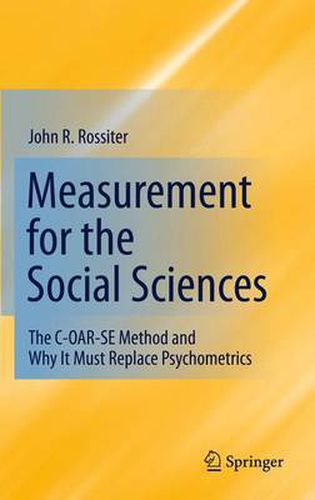Readings Newsletter
Become a Readings Member to make your shopping experience even easier.
Sign in or sign up for free!
You’re not far away from qualifying for FREE standard shipping within Australia
You’ve qualified for FREE standard shipping within Australia
The cart is loading…






This title is printed to order. This book may have been self-published. If so, we cannot guarantee the quality of the content. In the main most books will have gone through the editing process however some may not. We therefore suggest that you be aware of this before ordering this book. If in doubt check either the author or publisher’s details as we are unable to accept any returns unless they are faulty. Please contact us if you have any questions.
This book proposes a revolutionary new theory of construct measurement - called C-OAR-SE - for the social sciences. The acronym is derived from the following key elements: construct definition; object representation; attribute classification; rater entity identification; selection of item type; enumeration and scoring. The new theory is applicable to the design of measures of constructs in: * Management * Marketing * Information Systems * Organizational Behavior * Psychology * Sociology C-OAR-SE is a rationally rather than empirically-based theory and procedure. It can be used for designing measures of the most complex and also the most basic constructs that we use in social science research. C-OAR-SE is a radical alternative to the traditional empirically-based psychometric approach, and a considerable amount of the book’s content is devoted to demonstrating why the psychometric approach does not produce valid measures. The book argues that the psychometric approach has resulted in many misleading findings in the social sciences and has led to erroneous acceptance - or rejection - of many of our main theories and hypotheses, and that the C-OAR-SE approach to measurement would correct this massive problem. The main purpose of this book is to introduce and explain C-OAR-SE construct measurement theory in a way that will be understood by all social science researchers and that can be applied to designing new, more valid measures. Featuring numerous examples, practical applications, end-of-chapter questions, and appendices, the book will serve as an essential resource for students and professional researcher alike.
$9.00 standard shipping within Australia
FREE standard shipping within Australia for orders over $100.00
Express & International shipping calculated at checkout
This title is printed to order. This book may have been self-published. If so, we cannot guarantee the quality of the content. In the main most books will have gone through the editing process however some may not. We therefore suggest that you be aware of this before ordering this book. If in doubt check either the author or publisher’s details as we are unable to accept any returns unless they are faulty. Please contact us if you have any questions.
This book proposes a revolutionary new theory of construct measurement - called C-OAR-SE - for the social sciences. The acronym is derived from the following key elements: construct definition; object representation; attribute classification; rater entity identification; selection of item type; enumeration and scoring. The new theory is applicable to the design of measures of constructs in: * Management * Marketing * Information Systems * Organizational Behavior * Psychology * Sociology C-OAR-SE is a rationally rather than empirically-based theory and procedure. It can be used for designing measures of the most complex and also the most basic constructs that we use in social science research. C-OAR-SE is a radical alternative to the traditional empirically-based psychometric approach, and a considerable amount of the book’s content is devoted to demonstrating why the psychometric approach does not produce valid measures. The book argues that the psychometric approach has resulted in many misleading findings in the social sciences and has led to erroneous acceptance - or rejection - of many of our main theories and hypotheses, and that the C-OAR-SE approach to measurement would correct this massive problem. The main purpose of this book is to introduce and explain C-OAR-SE construct measurement theory in a way that will be understood by all social science researchers and that can be applied to designing new, more valid measures. Featuring numerous examples, practical applications, end-of-chapter questions, and appendices, the book will serve as an essential resource for students and professional researcher alike.